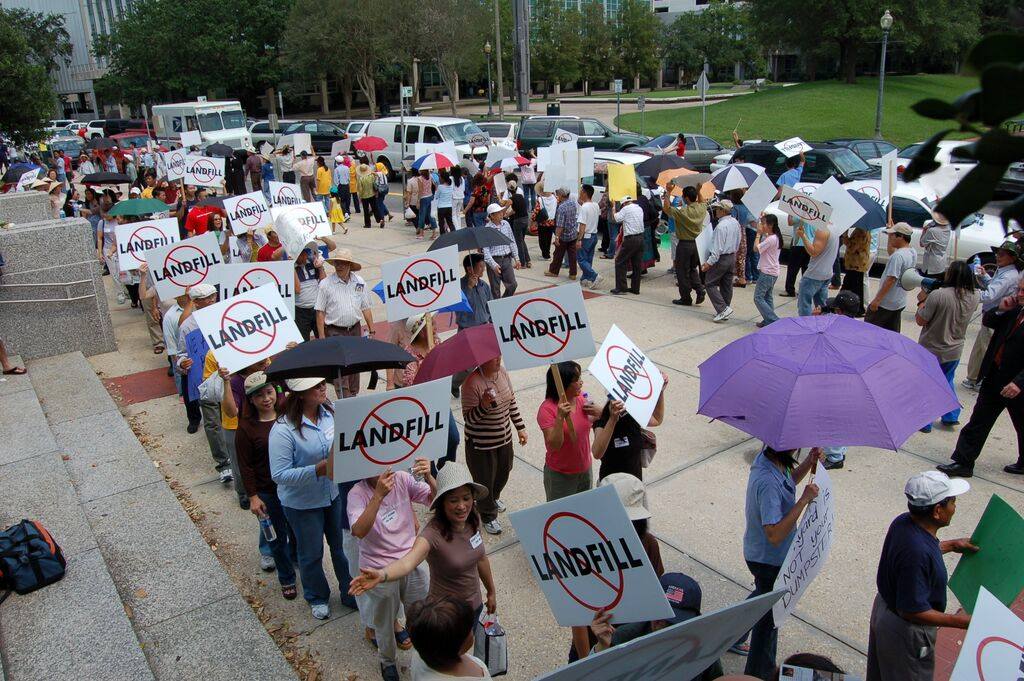Back to Asian Americans on Celluloid Timeline
A Village Called Versailles (2009)
Director and Producer: S. Leo Chiang
Length: 66 minutes
View the film on:
- https://vimeo.com/ondemand/avillagecalledversailles
- https://www.kanopy.com/product/village-called-versailles

Synopsis
A Village Called Versailles tells the story of a close-knit community of mostly Catholic Vietnamese Americans living in East New Orleans. Many families from this community originally came from two villages in North Vietnam, and they were twice exiled. They fled to South Vietnam in 1957, and then to New Orleans (via Fort Chaffee, Arkansas) in the late 1970s. When Hurricane Katrina hit the Crescent City, Versailles was an 8,000-strong working-class community that has achieved some financial stability, but remained culturally and politically isolated. Its main survival strategy was to keep quiet and not make a fuss. In the aftermath of the devastating storm, the community discovered that it has been left out of discussions about the rebuilding of New Orleans. This led the community to organize politically for the first time—first to fight for the restoration of basic services, and then for the closure of the Chef Menteur Landfill. The hurricane destroyed the community’s homes, but—as Father Vien Nguyen, the film’s chief storyteller said—the storm gave the people “a sense of who they are or who they could be.”
Significance
The Emmy Award-nominated A Village Called Versailles is significant for at least three reasons. First, this is one of the first documentaries to give attention to an established Asian American community in the American South. Second, the film showed the power of a coalition between African Americans and Asian Americans. Eric Tang’s article in the bibliography discusses the conditions that made this coalition possible in East New Orleans. Third, A Village Called Versailles showed how political organizing can help to bridge the generation gap that afflicted the community. This, in turn, allowed the community to simultaneously preserve their traditions better, and to Americanize and integrate itself into surrounding neighborhoods.
The filmmaker
One of the foremost Asian American documentarians of the past two decades, S. Leo Chiang was born in Taiwan. At 15, his parents sent him and his two younger siblings to get an education in the United States. These years of separation from his parents continue to affect his relationship to his family today. While Chiang was an MFA student at USC in the late 1990s, the Directors Guild of America commissioned him to direct and edit a documentary about the early careers of several well-known directors. More recently, he directed Mr. Cao Goes to Washington (an event he discussed near the end of A Village Called Versailles) and Our Time Machine (which examines an artist’s attempt to come to terms with his father’s dementia). A queer filmmaker, Chiang also directed Out Run, which profiles the only LGBT political party in the world. He was one of the producers of the recent PBS series Asian Americans. For much of his career, Chiang has split his time between Taiwan and the United States. He is known for developing really complex characters in his documentaries.
Back to Asian Americans on Celluloid Timeline
Further reading and listening
Organizations Featured in Film
About the Vietnamese American Community in New Orleans
- Tang, Eric. “A Gulf Unites Us: The Vietnamese Americans of Black New Orleans East.” American Quarterly, 63(1), 2011, pp. 117-149.
- Jensen, Chani. “Beyond Gastronomy: Locating the Vietnamese Population in New Orleans.” Louisiana Folklore Miscellany, 24, 2014.
- Hiltner, Stephen. “Vietnamese Forged a Community in New Orleans. Now It May Be Fading.” New York Times, May 5, 2018.
About Katrina, the Chef Menteur Landfill and the Vietnamese American Community
- Curtis, Wayne. “A Controversial New Orleans Landfill Is Set to Close, But Eco-disaster Still Looms.” Grist, Aug. 11, 2006.
- Li, Bethany. “’We Are Already Back’: The Post-Katrina Struggle for Survival and Community Control in New Orleans East’s Vietnamese Community of Versailles.” Asian American Law Journal, 18(1), 2011, pp. 25-56.
- Crunden, E.A. “Waste Management Scores Supreme Court Win in Long-running Fight Over New Orleans Landfill.” Waste Dive, Dec. 11, 2019.
About S. Leo Chiang
- DC Asian Pacific American Festival Zoom Chat with S. Leo Chiang about A Village Called Versailles and more recent projects
- Leo Chiang discusses his experience as a “parachute kid” who came to the US as a teenager while his parents stayed in Taiwan and his forthcoming film.
- Leo Chiang gives a workshop on creating complex documentary characters at Australian International Documentary Conference (March 2020)
